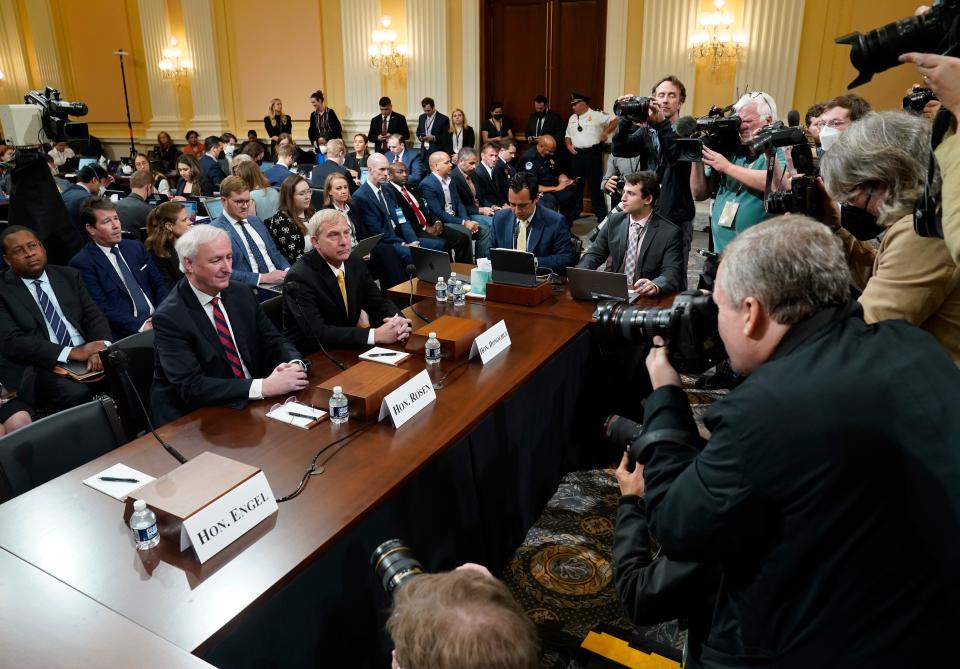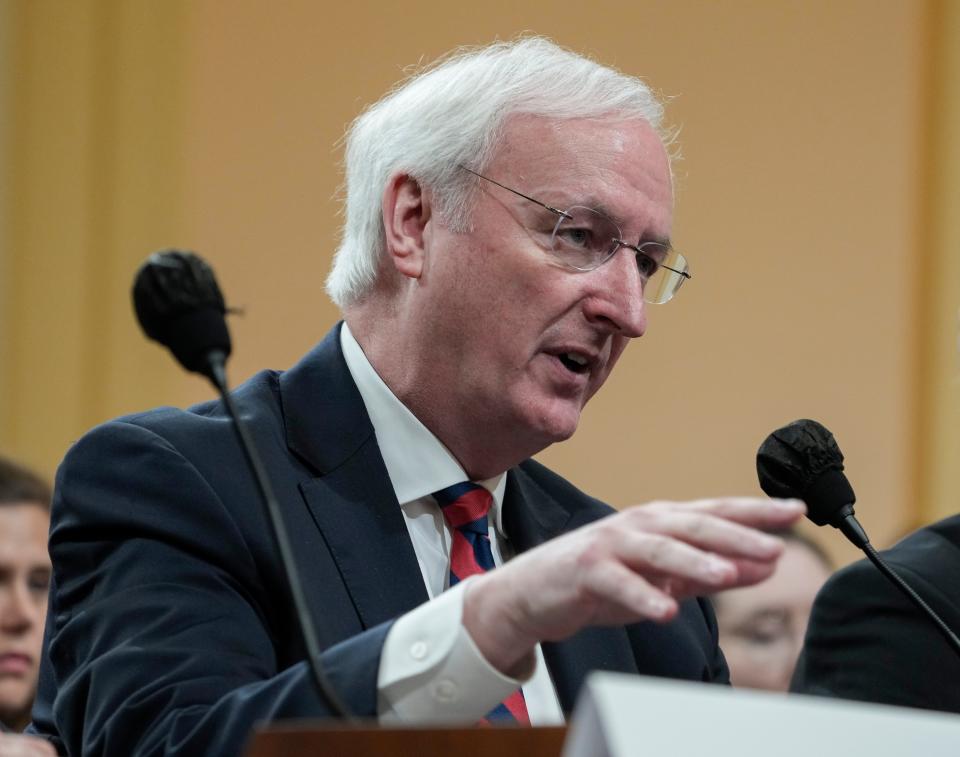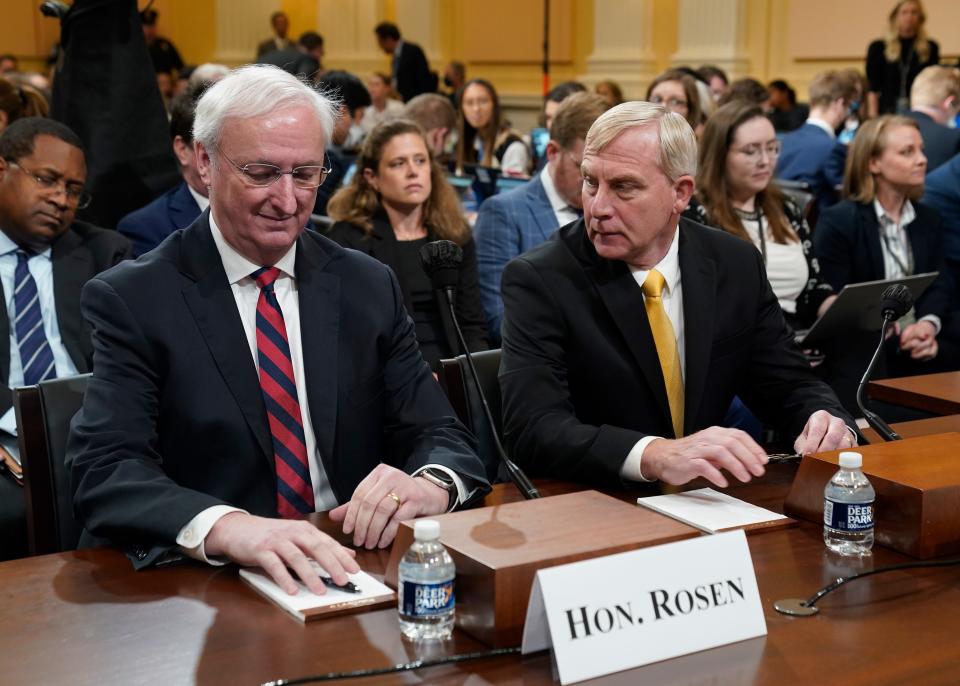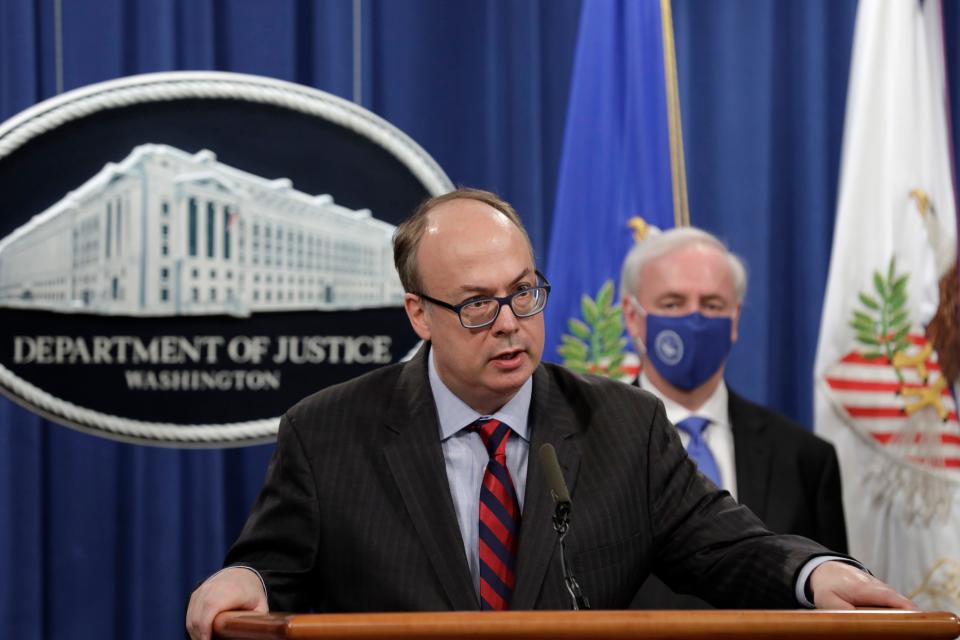Jan. 6 hearing takeaways: 'Just say it was corrupt,' Trump told DOJ officials about 2020 election
WASHINGTON – Former Justice Department officials told the House committee investigating the Capitol attack on Jan. 6, 2021, that former President Donald Trump repeatedly leaned on them to advance his baseless claims of election fraud and sought to install a loyalist as attorney general when his efforts were rebuffed.
Trump was disappointed in each strategy he pursued. Justice officials said they investigated dozens of claims of fraud in the 2020 presidential election and interviewed hundreds of witnesses, but they found no substantial wrongdoing.
Assistant Attorney General Jeffrey Clark drafted a letter urging officials in six states won by Joe Biden to submit alternate slates of electors favoring Trump, a strategy other administration lawyers rejected as "asinine" and potentially criminal.
Richard Donoghue, the former acting deputy attorney general, testified that Trump remained fixated on the same theme: "Just say it was corrupt and leave the rest to me and the Republican congressmen."
House Republicans seek Jan. 6 pardons: At least 5 House Republicans sought pardons after Jan. 6, including Brooks, Gaetz, testimony reveals
At an Oval Office meeting Jan. 3, 2021 – three days before the Capitol riot – Trump asked why he shouldn’t replace acting Attorney General Jeffrey Rosen with Clark. Trump relented only after Donoghue and other top lawyers at the Justice Department and White House threatened to resign in protest.
Here are some takeaways from the House panel’s fifth hearing this month reviewing Trump’s pressure on the Justice Department and his foiled effort to shake it up:
Trump called, met Rosen, Donoghue repeatedly in December 2020
Rosen testified that Trump called or met with him and Donoghue on Dec. 15, 2020 – before Rosen officially took over as acting attorney general – and nearly every day after he started in the post, from Dec. 23 to Jan. 3, 2021.
Trump explored appointing a special counsel, asked Rosen to meet with election lawyer Rudy Giuliani and asked whether the department would file a lawsuit in the Supreme Court.
“The Justice Department declined all of those requests that I was just referencing because we did not think that they were appropriate based on the facts and the law as we understood them,” Rosen testified.
Where did Trump PAC money go?: Trump committee raised millions to fight election fraud before Jan. 6. Here's how that money was spent.
Donoghue: Trump wielded ‘arsenal of allegations’

Justice officials told the committee every time they debunked a claim of election fraud, Trump would spew what Donoghue called an “arsenal of allegations” that sent them in other fruitless directions.
Trump cited a report Dec. 15, 2020, about Dominion Voter Systems, including a widely debunked theory about errors and bias in Antrim County, Michigan. Donoghue said there was only one error, for a rate of .0063% rather than the purported 68%.
Mark Meadows, former White House chief of staff, forwarded a conspiracy theory that Italian satellites were altering votes. When the Defense Department asked about it, Donoghue said the Justice Department wanted nothing to do with it.
“The whole thing was very, very murky at best and the video was absurd, but that we at the department were not going to have anything to do with it,” Donoghue said.
Miss Day 5 of the Jan. 6 hearing?: Trump's plan to topple the Justice Department and more

Clark scolded for meeting with Trump
Clark was the assistant attorney general for environmental issues and acting head of the civil division, jobs which Rosen and Donoghue said had nothing to do with election fraud. Clark met with Trump before Christmas 2020.
“You didn’t tell me about it, it wasn’t authorized, and you didn’t even tell me after the fact,” Rosen said he told Clark the day after the holiday. “This is not appropriate.”
Steven Engel, who was the assistant attorney general for the office of legal counsel, told the committee that when it comes to sensitive matters, only top department officials are supposed to talk to the White House to make sure investigations are “free from either the reality or the appearance of political interference.”
Jan. 6 poll: Nearly 6 in 10 Americans say Trump should be criminally charged for his role in Jan. 6 riot, ABC poll says
Donoghue tells Trump election fraud was a state responsibility
Donoghue said he grabbed a notepad from his wife’s nightstand when Trump called Dec. 27, 2020, with an allegation he hadn’t yet heard. The committee displayed photos of some of the handwritten notes as Donoghue testified that he repeatedly tried to explain to Trump that the Justice Department has a limited role in state elections.
“The bottom line was if a state ran their election in such a way that it was defective, that is to the state, or Congress, to correct,” Donoghue said he told Trump. “It is not for the Justice Department to step in.”
Bill Barr and Donald Trump: Bill Barr's complicated relationship with Donald Trump: From vital advocate to damning witness
White House lawyer tells Clark his strategy sounded criminal
Clark drafted a letter Dec. 28, 2020, for whoever served as attorney general to send to top lawmakers in six states Joe Biden won, suggesting they alter their results in favor of Trump.
Eric Herschmann, a former White House lawyer, said he was incredulous when he heard the strategy, calling it "asinine."
"Congratulations, you just admitted your first step or act you take as attorney general would be committing a felony,” Herschmann said he told Clark sarcastically. “You’re clearly the right candidate for this job.”
Clark refused to answer committee questions by citing his Fifth Amendment right against self-incrimination.
Jan. 6 committee evidence: Is the Jan. 6 committee sitting on explosive evidence of Trump's role in the Capitol assault?

Giuliani wanted DOJ officials who weren’t ‘frightened’
Republican lawmakers met with Trump at the White House Dec. 21, 2020, to discuss the election. Rep. Scott Perry, R-Pa., returned the next day to introduce Clark to Trump.
Giuliani, Trump’s campaign lawyer, described in a videotaped deposition why the president sought to give Clark election-related responsibilities.
“Beyond the president, I do recall saying to people that somebody should be put in charge of the Justice Department who isn’t frightened of what’s going to be done to their reputation because the Justice Department was full of people like that,” Giuliani said.
Rosen said he wasn’t worried about his reputation when rejecting baseless claims of election fraud.
“No, not at all,” Rosen said.
Ginni Thomas: What ties does Ginni Thomas, the Supreme Court justice's wife, have to Jan. 6?
Federal authorities visit Clark's home
On Wednesday, federal authorities went to Clark's home in Virginia.
A spokesman for the U.S. Attorney's Office in Washington confirmed that law enforcement activity occurred in the general vicinity of Clark's home but declined to describe the purpose of the action.
Jeffrey Clark's home searched: Feds search home of Jeffrey Clark, ex-DOJ official at center of Trump's effort to overturn election

Rosen spoke to Pence, congressional leaders during riot, but not Trump
Rosen testified he was on the phone “more or less nonstop” during the riot Jan. 6, 2021, with top administration officials and congressional leaders.
House Speaker Nancy Pelosi, D-Calif.; House Minority Leader Kevin McCarthy, R-Calif.; and other lawmakers were calling for help with the “dire situation,” Rosen said.
The Justice Department ended up sending more than 500 agents and officers from the FBI, the Marshals Service and the Bureau of Alcohol, Tobacco, Firearms and Explosives.
Rosen said he spoke twice with Vice President Mike Pence, once in a one-on-one call and then as part of a 7 p.m. conference call advising officials that it appeared order was close to being restored. But Rosen didn’t speak with Trump that day.
Trump-Pence feud on display: Trump disparages Pence in Nashville speech for lack of 'courage' as Jan. 6 hearings continue

Witness: Lawmakers sought pardons after Capitol attack
After the riot, a handful of Republican lawmakers asked the White House for pardons, according to Cassidy Hutchinson, an aide to Meadows. The requests came from Reps. Andy Biggs of Arizona, Mo Brooks of Alabama, Matt Gaetz of Florida, Louie Gohmert of Texas and Scott Perry of Pennsylvania, Hutchinson said.
Each of the lawmakers denied wrongdoing and said the committee was playing politics. Perry strongly denied asking for a pardon in a tweet.
John McEntee, former director of the White House presidential personnel office, told the committee Trump mentioned a “blanket pardon” for those involved in Jan. 6.
“I know he had hinted at a blanket pardon for the January 6th thing for anybody,” McEntee said. “But I think he had for all the staff and everyone involved. Not with Jan. 6th, but just before he left office I know he had talked about that.”
Poll: Majority of Americans follow Jan. 6 hearings
A majority of Americans say they are following coverage of the House committee investigating the Capitol attack, according to a Quinnipiac University poll released Thursday.
The poll found 58% of Americans following the committee’s work, including 26% following “very closely” and 32% tracking it “somewhat closely,” according to the poll June 17 to 20 of 1,524 adults with a margin of error of plus or minus 2.5 percentage points.
Americans were split on whether charges are warranted against Trump. A 59% majority says he bears a measure of responsibility for the attack, but respondents split evenly – 46% to 47% – over whether he should be charged criminally.
“It’s a toss-up,” Quinnipiac polling analyst Tim Malloy said. “There is no consensus.”
This article originally appeared on USA TODAY: Jan 6 takeaways: Trump tells DOJ of 2020 'just say it was corrupt'


